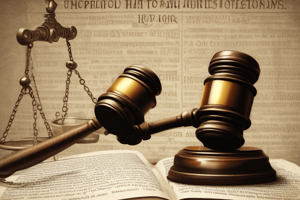Podcast
Questions and Answers
What is one of the two general requirements for criminal liability?
What is one of the two general requirements for criminal liability?
- Culpable mental state
- Entrapment
- Accessory liability
- Voluntary act (correct)
What is an example of failing to perform an act which one is physically capable of doing and which it was one's duty to perform?
What is an example of failing to perform an act which one is physically capable of doing and which it was one's duty to perform?
- A police officer arresting a suspect
- A teacher teaching a lesson
- A doctor performing CPR on a neighbor
- A doctor choosing not to perform CPR on a neighbor whom they are in a property dispute with (correct)
What is the term for a situation in which a person is induced to commit a crime that the person would not have committed otherwise?
What is the term for a situation in which a person is induced to commit a crime that the person would not have committed otherwise?
- Entrapment (correct)
- Accessory liability
- Duress
- Culpable mental state
What is one of the objectives of this course?
What is one of the objectives of this course?
What is the relationship between intoxication and criminal liability?
What is the relationship between intoxication and criminal liability?
What is the second general requirement for criminal liability?
What is the second general requirement for criminal liability?
What is the mental state required when a person acts with the conscious object of engaging in certain conduct or causing a result?
What is the mental state required when a person acts with the conscious object of engaging in certain conduct or causing a result?
A person acts with criminal negligence when they fail to be aware of a substantial and unjustifiable risk that circumstances exist or a result will follow, and such failure constitutes a what?
A person acts with criminal negligence when they fail to be aware of a substantial and unjustifiable risk that circumstances exist or a result will follow, and such failure constitutes a what?
What is required for a defendant to be held accountable for the actions of another?
What is required for a defendant to be held accountable for the actions of another?
What is the definition of entrapment according to the Lectic Law Dictionary?
What is the definition of entrapment according to the Lectic Law Dictionary?
What is the effect of voluntary intoxication on criminal liability?
What is the effect of voluntary intoxication on criminal liability?
What is the condition required for involuntary intoxication to be a defense?
What is the condition required for involuntary intoxication to be a defense?
A person acts recklessly when they consciously disregard a what?
A person acts recklessly when they consciously disregard a what?
What is the effect of involuntary intoxication on criminal liability?
What is the effect of involuntary intoxication on criminal liability?
Who has the burden of injecting the issue for a defense of intoxicated or drugged condition?
Who has the burden of injecting the issue for a defense of intoxicated or drugged condition?
What is the second requirement for entrapment?
What is the second requirement for entrapment?
What is the primary focus of the General Provisions in the Missouri Criminal Code?
What is the primary focus of the General Provisions in the Missouri Criminal Code?
Which of the following is an example of a voluntary act?
Which of the following is an example of a voluntary act?
What is the term for a situation in which a person is not criminally liable due to being forced to commit a crime?
What is the term for a situation in which a person is not criminally liable due to being forced to commit a crime?
What is the result of a person's conscious effort and determination in committing a voluntary act?
What is the result of a person's conscious effort and determination in committing a voluntary act?
What is the relationship between the two general requirements for criminal liability?
What is the relationship between the two general requirements for criminal liability?
What is the primary difference between voluntary and involuntary intoxication in terms of criminal liability?
What is the primary difference between voluntary and involuntary intoxication in terms of criminal liability?
What is the mental state required when a person is aware of the nature of their conduct or that the circumstances exist?
What is the mental state required when a person is aware of the nature of their conduct or that the circumstances exist?
Under what condition can a person be held accountable for the actions of another?
Under what condition can a person be held accountable for the actions of another?
What is required for a person to be considered 'entrapped'?
What is required for a person to be considered 'entrapped'?
What is the effect of involuntary intoxication on criminal liability?
What is the effect of involuntary intoxication on criminal liability?
What is the difference between 'recklessly' and 'criminal negligence'?
What is the difference between 'recklessly' and 'criminal negligence'?
What is the mental state required for 'purposely' conduct?
What is the mental state required for 'purposely' conduct?
What is the role of the defendant in raising the issue of involuntary intoxication as a defense?
What is the role of the defendant in raising the issue of involuntary intoxication as a defense?
What is the difference between 'purposely' and 'knowingly'?
What is the difference between 'purposely' and 'knowingly'?
When can a person be held accountable for the actions of another?
When can a person be held accountable for the actions of another?
What is the relationship between 'recklessly' and 'criminal negligence'?
What is the relationship between 'recklessly' and 'criminal negligence'?
Flashcards are hidden until you start studying
Study Notes
General Provisions of Missouri Criminal Code
- The code covers general principles of criminal liability, including basic requirements of conduct, culpable mental states, and accessory liability.
- It also covers general defenses, such as entrapment, duress, and the effect of intoxication on criminal liability.
Two General Requirements for Criminal Liability
- Voluntary Act: a bodily movement resulting from conscious effort and determination, or failure to perform an act that one is physically capable of doing and has a duty to perform.
- Culpable Mental State: the mental state required for criminal liability, including purposely, knowingly, recklessly, and with criminal negligence.
Culpable Mental States
- Purposely: when a person's conscious object is to engage in conduct or cause a result.
- Knowingly: when a person is aware of the nature of their conduct or circumstances, or that their conduct is practically certain to cause a result.
- Recklessly: when a person consciously disregards a substantial and unjustifiable risk that circumstances exist or a result will follow.
- With Criminal Negligence: when a person fails to be aware of a substantial and unjustifiable risk that circumstances exist or a result will follow.
Responsibility for the Conduct of Another
- A defendant can be held accountable for the actions of another if they have the required mental state for the crime.
- The defendant must have aided or agreed to aid or attempted to aid the other person in planning, committing, or attempting to commit the offense.
Entrapment
- Defined as when a person is induced or persuaded by law enforcement officers or their agents to commit a crime they had no previous intent to commit.
- Two requirements for entrapment: (1) solicitation or encouragement by an officer or someone working with an officer, and (2) the person was not already predisposed to commit the crime.
Effect of Intoxication on Criminal Liability
- Voluntary intoxication or drugged condition is not admissible to negate a mental state.
- Involuntary intoxication can be a defense if the person lacked the capacity to know or appreciate the nature, quality, or wrongfulness of the criminal conduct.
- Involuntary intoxication occurs when the person was forced to consume the substance or had no way of knowing it would cause intoxication.
General Provisions of Missouri Criminal Code
- The code covers general principles of criminal liability, including basic requirements of conduct, culpable mental states, and accessory liability.
- It also covers general defenses, such as entrapment, duress, and the effect of intoxication on criminal liability.
Two General Requirements for Criminal Liability
- Voluntary Act: a bodily movement resulting from conscious effort and determination, or failure to perform an act that one is physically capable of doing and has a duty to perform.
- Culpable Mental State: the mental state required for criminal liability, including purposely, knowingly, recklessly, and with criminal negligence.
Culpable Mental States
- Purposely: when a person's conscious object is to engage in conduct or cause a result.
- Knowingly: when a person is aware of the nature of their conduct or circumstances, or that their conduct is practically certain to cause a result.
- Recklessly: when a person consciously disregards a substantial and unjustifiable risk that circumstances exist or a result will follow.
- With Criminal Negligence: when a person fails to be aware of a substantial and unjustifiable risk that circumstances exist or a result will follow.
Responsibility for the Conduct of Another
- A defendant can be held accountable for the actions of another if they have the required mental state for the crime.
- The defendant must have aided or agreed to aid or attempted to aid the other person in planning, committing, or attempting to commit the offense.
Entrapment
- Defined as when a person is induced or persuaded by law enforcement officers or their agents to commit a crime they had no previous intent to commit.
- Two requirements for entrapment: (1) solicitation or encouragement by an officer or someone working with an officer, and (2) the person was not already predisposed to commit the crime.
Effect of Intoxication on Criminal Liability
- Voluntary intoxication or drugged condition is not admissible to negate a mental state.
- Involuntary intoxication can be a defense if the person lacked the capacity to know or appreciate the nature, quality, or wrongfulness of the criminal conduct.
- Involuntary intoxication occurs when the person was forced to consume the substance or had no way of knowing it would cause intoxication.
Studying That Suits You
Use AI to generate personalized quizzes and flashcards to suit your learning preferences.




